India wants to implement a European Union rule that will require smartphones to have a universal USB-C charging port, and has been in talks with manufacturers about introducing the requirement in India by June 2025, six months after the deadline in the EU. While all manufacturers including Samsung have agreed to India’s plan, Apple is pushing back.
Apple has for years offered a unique lightning connector port on its iPhones. The EU, however, estimates a single charger solution would save about $271 million for consumers, and India has said the move will reduce e-waste and help users.
In a closed-door Nov. 28 meeting chaired by India’s IT ministry, Apple asked officials to exempt existing iPhone models from the rules, warning it will otherwise struggle to meet production targets set under India’s production-linked incentive (PLI) scheme, according to the meeting minutes seen by Reuters.
Aditya Kalra & Munsif Vengattil
Typical example of Apple’s arrogance and entitlement: they want to receive fiscal incentives from the government for investments in local manufacturing, but also special exemptions from an upcoming USB-C regulation to keep selling older – and by then cheaper – iPhone models on the Indian market. Ironically, this issue was brought on by Apple’s own obstinance and greed, as the company kept the Lightning port around for so long to collect licensing fees from accessories manufactures.

Unfortunately for Apple, I don’t think they have much leverage in this case (except for quietly bribing key Indian officials): among US tech companies, Apple has the largest exposure to China, being highly dependent on the country for manufacturing and as a key sales market. We saw Apple repeatedly concede to the demands of Chinese authorities to keep their privileges. Many companies have looked to diversify manufacturing away from China amid ongoing US-China geopolitical tension, and India seems like the obvious destination, if only for its large population. This potential scale is especially important for Apple’s operations, so if India’s government stands its ground, I’m fairly confident Apple will concede in this case as well and swallow any potential losses.
Post a Comment